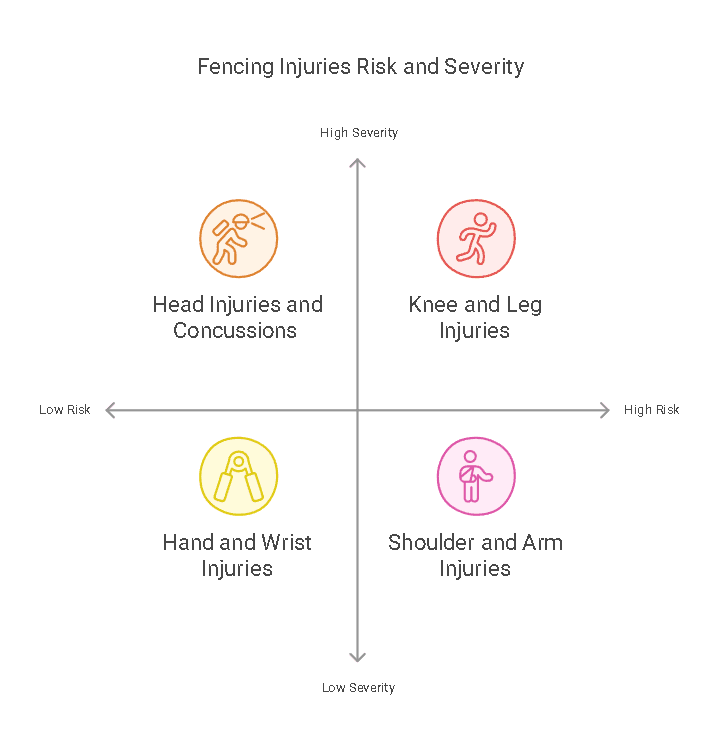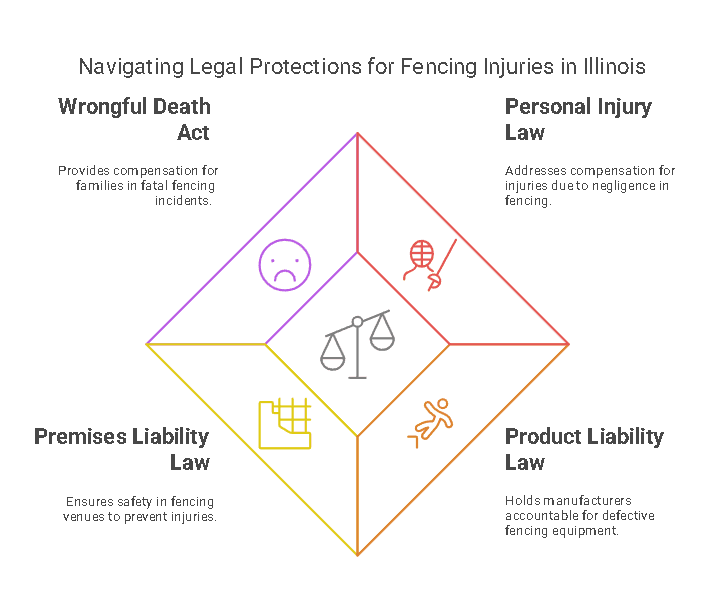Fencing is an elegant and competitive sport that requires precision, speed, and skill. However, despite its controlled environment, fencing carries inherent risks, especially during tournaments, events, or even training sessions. Accidents in fencing can lead to severe injuries, whether due to faulty equipment, inadequate safety protocols, or the actions of other participants.
If you or someone you care about has been injured while fencing, we are here to protect your rights. Our fencing injuries attorney in Chicago is dedicated to helping you recover the compensation you deserve to aid in your recovery and secure your future.
How Our Legal Team in Chicago Assists Fencing Injury Victims
Establishing liability in fencing injury cases can be intricate, given the technical nature of the sport and its reliance on specialized equipment and adherence to safety protocols. At Chicago Injury Lawyer, we build compelling cases to hold the responsible parties accountable. Here’s how we approach your claim:
Thorough Case Evaluation
Our legal team investigates all aspects of your accident to identify who may be liable for your injuries. Was the incident caused by defective fencing equipment, inadequate supervision, or another participant’s reckless behavior? We examine every detail to craft a strong case.
Gathering Vital Evidence
We collect and analyze all necessary evidence to support your claim, including witness statements, medical records, video footage from the event or practice, and expert opinions. We work with sports injury specialists and fencing professionals to reconstruct the incident if necessary.
Identifying Negligence
Whether your fencing injury stemmed from poorly maintained facilities, defective equipment, or negligence by a coach, instructor, or event organizer, we investigate all possible sources of liability. We work to ensure you receive compensation for your medical costs, pain and suffering, and lost income.
Maximizing Your Compensation
Our ultimate goal is to recover full compensation for your injuries. From negotiating with insurance companies to pursuing litigation if required, we fight for the best possible outcome on your behalf.
Common Fencing Injuries and Their Impact
Fencing is considered a low-impact sport but is not without risk, particularly in competitive environments, tournaments, or training sessions. The nature of the sport, with rapid movements and the use of weapons, can lead to the following injuries:
Head Injuries and Concussions: Despite the use of helmets, head injuries can occur during fencing, especially in the heat of competition or when equipment fails. These injuries can result in symptoms such as headaches, memory loss, dizziness, or long-term cognitive challenges.
Eye and Facial Injuries: Accidents involving improperly fitted masks or defective equipment can lead to serious eye injuries or facial trauma. These injuries may require surgical intervention and could result in permanent scarring or loss of vision.
Hand and Wrist Injuries: Due to the nature of the sport, hands and wrists are particularly vulnerable. Sprains, fractures, and tendon injuries are common, especially during high-intensity events or improper weapon handling.
Shoulder and Arm Injuries: Repetitive movements and improper technique during training or matches can lead to shoulder dislocations, rotator cuff injuries, or strain in the arm muscles. These injuries often require physical therapy or surgery and impact mobility and performance.
Knee and Leg Injuries: Fencing’s fast footwork and lunges significantly strain the knees and lower body. Torn ligaments, such as the anterior cruciate ligament (ACL) or medial collateral ligament (MCL), are frequent injuries that can sideline athletes for extended periods.
Spinal and Back Injuries: Poor posture, overtraining, or falls during a match can result in back injuries, ranging from muscle strain to herniated discs. Severe cases may require long-term medical care or rehabilitation.
By recognizing these risks, fencers and event organizers can take proactive measures to minimize injuries, such as using high-quality equipment, maintaining proper technique, and adhering to safety guidelines.

Seeking Compensation for Fencing-Related Injuries
Fencing injuries can disrupt your life, impacting your health, finances, and emotional well-being. Our top-rated Chicago fencing injuries lawyer work to recover compensation for:
- Medical Expenses: We ensure that all costs related to your treatment, from emergency care to long-term rehabilitation, are covered.
- Lost Wages: If your injury affects your ability to work, we seek compensation for current and future income losses.
- Pain and Suffering: We fight for damages related to the physical pain and emotional distress caused by your injury.
- Rehabilitation Costs: Your claim may include expenses for physical therapy, adaptive equipment, or modifications to your home.
- Diminished Quality of Life: If your injury prevents you from enjoying fencing or other activities, we seek compensation for the impact on your daily life.
Legal Considerations for Fencing Injuries in Illinois
Illinois law provides a framework for addressing injuries sustained during sports, including fencing. Key legal provisions that may affect your claim include:
Personal Injury Law
You might be entitled to compensation if another person’s negligence caused your fencing injury. Under Illinois, the Personal Injury Act claims must be filed within two years of the incident.
Product Liability Law
The manufacturer, distributor, or retailer may be held accountable when defective fencing gear—such as faulty masks, blades, or gloves—causes an injury. According to the Product Liability Act, these claims also have a two-year statute of limitations.
Premises Liability Law
Fencing clubs, training facilities, and event organizers must maintain safe environments. If inadequate safety measures, poor equipment maintenance, or hazardous conditions led to your injury, you might have grounds for a claim as per the Premises Liability Act.
Wrongful Death Act
In tragic cases where a fencing injury results in death, surviving family members can pursue compensation under Illinois’ Wrongful Death Act. These claims cover funeral costs, loss of financial support, and emotional suffering and must be filed within two years of the individual’s passing.

Determining Liability in Fencing Injuries
Liability in fencing accidents can be complex, often involving multiple parties. Our personal injury attorneys investigate the unique circumstances of your case to identify who may be responsible, including:
- Other Participants: Careless or reckless behavior by another fencer can lead to accidents.
- Coaches and Instructors: Negligence in providing proper training, supervision, or safety guidelines may make them liable.
- Event Organizers: Tournament and event hosts must ensure adequate safety measures are in place. Failure to do so could make them responsible for injuries.
- Equipment Manufacturers: Defective fencing equipment, such as faulty masks or weapons, can result in severe injuries, making manufacturers or distributors accountable.
Contact Us for Legal Help with Fencing Injuries
Don’t let a fencing injury disrupt your life without taking action. Our skilled lawyers at Chicago Injury Lawyer are here to guide you every step of the way. From assessing your case to fighting for justice, we prioritize your recovery and well-being.
Take the first step toward securing the compensation and support you deserve—contact us today for a consultation.
Frequently Asked Questions
1. What should I do immediately after a fencing injury?
Seek medical attention and document your injuries. If possible, collect evidence from the scene, including photos and witness accounts.
2. Can I file a claim if my injury occurred during a fencing tournament?
Yes. You may be eligible to file a claim if negligence, defective equipment, or unsafe conditions contributed to your injury.
3. How long do I have to file a fencing injury claim in Illinois?
You generally have two years from the date of the injury to file a claim, but contacting an attorney early ensures you meet all legal deadlines.



